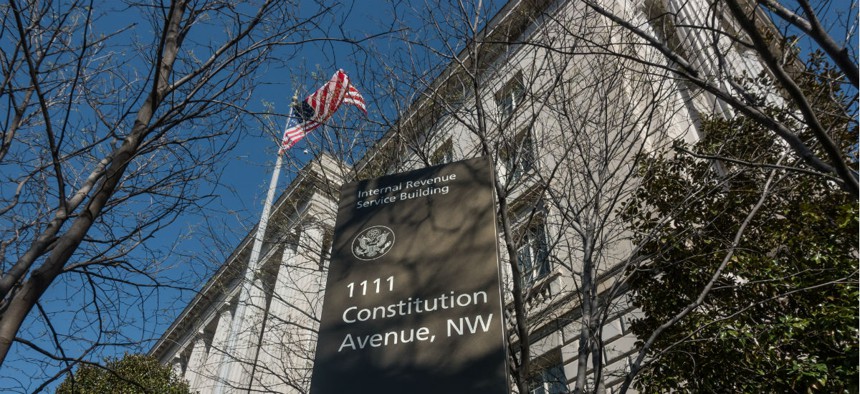
bakdc/Shutterstock.com
IRS Acting Chief Is Pleased With Funding Hike Critics Say Isn’t Enough
Stretched staff will expand to implement the new tax law as Congress mulls reforms.
After months of congressional plans for continued flat funding, the Internal Revenue Service this month found itself on the receiving end of a $320 million cash infusion via the just-enacted $1.3 trillion fiscal 2018 omnibus spending bill.
The agency—which has seen its budget reduced yearly since 2010—is immersed in the 2018 tax filing season while simultaneously implementing a landmark new tax law that critics characterize as rushed and sloppily drafted.
Both endeavors are going well “so far,” according to acting Internal Revenue Commissioner David Kautter, who spoke on Monday to the Tax Executives Institute in Washington. “Through March 16, the IRS received more than 77 million individual income tax returns and issued more than 61 million refunds for more than $182 billion,” he said. “Thus far, about 80 percent of returns filed claimed a refund, compared with 81 percent this time last year.”
To implement the Tax Cuts and Jobs Act, the agency has set up a Tax Reform Implementation Office to coordinate retraining and public education run by “members from across the agency who represent our best and brightest leadership,” Kautter said.
In early January, the IRS updated payroll withholding tables for 2018 to reflect new brackets and exemptions, and in February it issued a revised Form W-4. Also in the works are new guidance publications.
“We estimate we will need to create or revise about 450 such products,” most for the 2019 tax season, Kautter added. “This is a tall order. It’s more than double the number of forms we would create or revise in a typical year.” Each form or blank return costs about $75,000 to redo, he said.
The new law gives IRS 79 explicit grants of regulatory authority, the acting chief reported, though more than 70 percent of the funding will go to reprogramming and modernizing information technology systems.
The agency projects it will need to hire 1,000 seasonal employees to handle increased call volume created by the law’s changes, with retraining requiring 40,000 hours for customer service representatives. More legally trained employees are being added to the Office of the Chief Counsel, Kautter said, “given that resource cuts over the last decade have left Chief Counsel with the smallest number of employees in about 25 years.”
The White House, in its fiscal 2019 budget proposal, wanted to raise caps on the enforcement budget for its program integrity efforts, which the Treasury Department said would generate $4 for every $1 invested. But that plan didn’t make it into the omnibus bill.
The agency’s training classes, an attorney in the IRS’s Exempt Organizations division told Government Executive, are being scheduled but are not rushed because not all the coming changes take effect this year.
The $320 million in new funds “is a positive step toward restoring the damaging cuts of recent years, [but] still leaves funding below the fiscal 2010 level,” said National Treasury Employees Union National President Tony Reardon. “The administration’s budget request for fiscal 2019 would actually reduce funding for the agency, reversing the very modest gains included in the omnibus.”
Others worry about tax avoidance and the agency’s long-term budget health. “Given some of the law’s features and the hasty way it was crafted, it will likely fuel aggressive efforts by some businesses and wealthy individuals to push the law’s outer limits, and possibly beyond, to minimize their taxes,” wrote researcher Emily Horton for the liberal-leaning Center for Budget and Policy Priorities. The omnibus bill “cuts all other IRS funding by $124 million, leaving overall IRS funding a full $2.5 billion—18 percent—below the 2010 level, adjusted for inflation.”
Paul Streckfus, editor of the EO Tax Journal, told Government Executive “the legislative language is a mess, but for the high-level folks at Treasury and IRS, the new tax law is a challenge and a resume-enhancer if and when they seek private employment.” Though he had not heard complaints from IRS employees, many nonprofits—particularly hospitals and colleges and universities—are upset about major policy changes, he said. “Overall, the result of the tax act provisions affecting exempt organizations is confusion and gross unfairness."
Key lawmakers such as House Ways and Means Committee Chairman Kevin Brady, R-Texas, and Sen. Finance Committee Chairman Orrin Hatch, R-Utah, are already making plans for additional legislation to make “technical corrections” to the new law. Industry and accounting groups are applying pressure.
There’s also a push to reorganize the tax agency. “We think a new and improved tax code really demands a new and improved IRS,” Brady said in March. “You’re going to see in April a bill moving forward that really begins to restructure the IRS—really focuses it on the taxpayer-oriented organization that we deserve.”
On Monday, Reps. Lynn Jenkins, R-Kan., and Rep. John Lewis, D-Ga., both on Ways and Means, introduced a bill to “redesign” the IRS for the first time since 1998. It addresses modernization, taxpayer rights and IRS obligations to keep taxpayers notified of movements in their cases—all issues raised over the past year in multiple hearings.
“At a time when most Americans are able to spend entire days working with just their iPhones, the IRS still relies on fax machines for many official communications,” Jenkins said. “It’s time for a makeover.”
Added Lewis, “this is the first time in many years that we will have a bipartisan taxpayer services bill ready for Tax Day. Unfortunately, the bill does not repeal the private debt collection program, but it makes good progress in protecting low- and middle-income taxpayers from harassment and abuse.”
Image via bakdc/Shutterstock.com.







